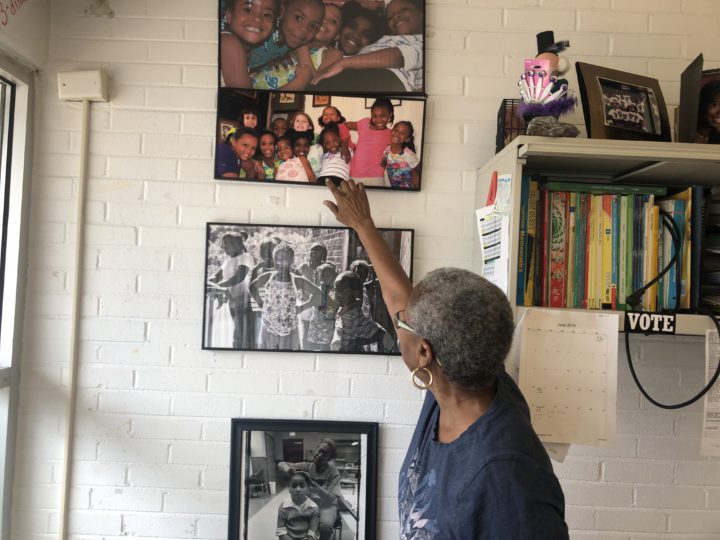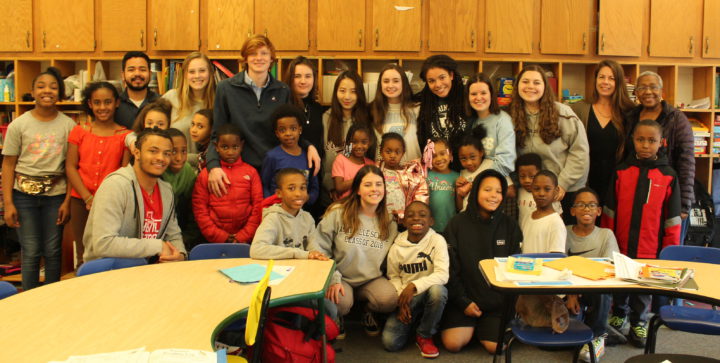Being a kid can be tough. Between school and homework, learning how to play nice versus just being yourself, many children look to a parent, teacher or other mentor to help them understand the world around them, someone with whom they can share their worst fears and biggest dreams.
For countless numbers of Buncombe County kids, that someone has been Elinor Earle. During more than 30 years, “Ms. Earle,” as she’s known to children and adults alike, has worked to level the playing field for kids living in the city’s public housing communities.
In her role as director of Youthful HAND, an after-school program funded by United Way and the Asheville Housing Authority, Earle has stayed true to one primary goal over the years: closing the academic achievement gap between black and white students that has plagued the city’s schools for decades. And while numerous resources and initiatives have been devoted to narrowing the disparity, Earle’s deep-rooted dedication to serving Asheville’s youth stands out.
Empty stomachs
After owning a successful housecleaning service and raising two children of her own, Earle says she was hired as director of the Youthful HAND program in the late ’80s. An acronym for “housing against narcotics and drugs,” Youthful HAND was created to provide support and tutoring for elementary school children living in subsidized housing. It was based at Lee Walker Heights, Asheville’s oldest public housing development. Even back then, she remembers, some kids there struggled to keep pace with their peers.
“I had been working for youth and senior citizens all my life,” the 77-year-old Earle explains. Once the Housing Authority hired her, she continues, “I just started learning little pieces and putting them together, and little by little I found out that the biggest thing was that our kids couldn’t read. I just didn’t believe that we have a whole city of black kids and they can’t learn how to read. So I said, ‘Let me see if I can do anything about this.’”
The program, she notes, provides a structured environment where children in kindergarten through fifth grade can complete homework and be tutored in reading, math and language skills. Earle also includes lessons in personal hygiene and character-building, as a way to instill confidence and independence in her students. Her work has always been guided by a keen awareness of the specific challenges that children in public housing often face.
“Most people don’t understand what these kids have gone through before they get up and go to school,” she says. “The kids get up hungry and then they go to school, and what they get at school they don’t like. So they’re hungry.” Add to that the overall lack of structure in their lives, she continues, and “It can be kind of sad.”
A clear difference
Determined to reduce the achievement gap, Earle met with parents and teachers, activists and elected leaders, trying to address the issue head on. But her focus was always on forging deep and authentic relationships with the children who came under her care — bonds that have often endured long after they left her classroom.

“This one right here, she went to college,” says Earle, pointing to a collection of framed photos that hang behind a desk overflowing with folders and notebooks in her classroom at the Hillcrest Community Center. “This one just graduated from high school; she’s trying to get into Howard University. These were some of my first kids.”
“Ms. Earle has, over time, put her own personal stamp on it to really serve as a liaison between schools, parents and students to figure out what individual students need in terms of their enrichment,” says David Nash, the Housing Authority’s executive director. “What I hear from the Asheville City Schools is that there’s a clear difference in the achievement levels in the students who are in Ms. Earle’s program compared to the general population.”
Her efforts have not gone unnoticed. In 2015, Earle accepted the Asheville City Schools Foundation’s Lifetime Achievement Award for her work with Youthful HAND. That same year, OpenDoors of Asheville honored Earle as its Laureate of the Year.
Relentless determination
In 2018, Lee Walker Heights was slated for a complete renovation, causing Earle and Youthful HAND to move to the Hillcrest Apartments, another housing complex just west of downtown.
Taking her seat among the brightly colored shapes and numbers adorning the walls of her classroom, she patiently waits as about 40 kids file noisily into the building. The room quickly becomes lively with the sounds of rambunctious children’s laughter and conversation, until Earle gives the stern but loving command that it’s now time for homework.
Seated among the children is 17-year-old Kelsey Mann, who listens intently as a young girl reads aloud. A junior at the Asheville School, Mann is one of several students there who serve as volunteer tutors at the after-school program Monday through Thursday.
“Ms. Earle is one of the most consistently passionate people that I’ve ever met,” says Mann, who’s volunteered with Youthful HAND since 2018. “The goal has never changed for as long as I‘ve known her. It’s always, ‘We need to bridge this achievement gap, and I’m going to do it, and I don’t care what I have to do or how long I have to do it.’ I have an incredible amount of respect for that, and I think the kids do too.”
Mann also volunteers at Camp Good Trouble, a joint project of the Asheville School and Youthful HAND. Now in its third year, the summer camp on the private school’s campus hosts Earle’s students for a week of learning and enrichment activities.
“She definitely takes care of all the kids there, but she also has to find time to mentor our tutors,” says Varghese Alexander, the school’s assistant dean of faculty. “Often you’ll find her talking to more than a handful of our students after all of her children leave and just telling them about life.”

“We’ve been talking a lot about college recently,” adds Mann. “It’s a very organic relationship that we have over here.”
Calculated risk
But Youthful HAND volunteers must also confront the reality of working in communities with high poverty rates. On Feb. 9, 24-year-old Hillcrest Apartments resident Jailyn Dumari Morton was shot and killed there — the third shooting at the complex since last September. That led Asheville School administrators to pause the volunteer program. Ben Williamson, the assistant head of school for student life, says they considered either moving the program to a new location or taking an extended break to assess their students’ safety.
“The headmaster didn’t want to put them into a place of danger,” Earle explains, adding, “I told him whatever they decided, I would understand.”
Mann, however, says she and her fellow student volunteers weren’t deterred by the shooting.
“I feel really safe here: I think about when there were homicides before, and I’m very aware of the drug trade around. I know what’s going on, and I understand why my school, as an institution, needed to protect us,” she says. “But it was honestly something that was very hard for me, not being able to come, because I felt like I was letting the kids down. I abide by a philosophy of if they’re somewhere that’s considered dangerous, I’m very willing to be there with them.”
After deliberating for a few days, the administrators decided to let the volunteers return to Hillcrest.
“It’s really a credit to our students and the strength of the relationships they’ve forged with Ms. Earle and those kids. They didn’t bat an eye,” says Williamson. “The program needs to be at Hillcrest; our kids want to be at Hillcrest. And that program’s not about us: Our job is to serve them.
“It has been really an honor and privilege for us to be a part of the relationship that we have with Ms. Earle and the kids. It has been transformational for so many of our kids,” he adds. “We’re looking forward to many more years of serving that relationship.”
Staying the course
Despite those noble efforts, however, the latest data from the Asheville City Schools indicates that the disparity in the academic achievement levels of its black and white students — already the worst in the state — has only increased since 2017. Meanwhile, the system has seen three superintendents leave the post since 2013. And news reports about incoming superintendent Gene Freeman, who’s expected to start July 1, have raised questions about his track record, including a lack of transparency, unusually generous contract terms and extended absence from his current job as head of the Fox Chapel Area School District in Pennsylvania.
Despite her determination, Earle says she can’t help but feel frustrated by the system’s instability and overall lack of progress.
“When you’re young, you say, ‘OK, we’re fighting this battle to close this achievement gap.’ And a new superintendent comes in and says, ‘We’re going to do this and this.’ … Well, the achievement gap is still getting wider,” she says. “I don’t like the idea of throwing anyone under the bus — the school system or the parents. Just tell us what we need to do to bring these kids up to where they need to be, and do it. Stop talking about it and do it.”
And while Earle believes in Youthful HAND as an after-school program, she says more needs to be done to help kids before they even enter the school system. For the first time, the educator says she plans to offer a summer program called Jumpstart, which will introduce numbers, colors, shapes, letters and other foundational concepts to 25 children before they enter kindergarten. She hopes the new program, which is also funded by United Way and the Housing Authority, will help young children lay the groundwork for learning.
“What happens is these kids, when they start off in kindergarten, they’re not on the same foot as everybody, and once you get behind, you stay behind,” Earle explains.
And while enduring the persistent challenges that too many children in the district face, Earle says she has no plans to retire or change her decadeslong mission.
“The resources are here,” she says. “Everybody just needs to pitch in. We just need to be a village.”




Before you comment
The comments section is here to provide a platform for civil dialogue on the issues we face together as a local community. Xpress is committed to offering this platform for all voices, but when the tone of the discussion gets nasty or strays off topic, we believe many people choose not to participate. Xpress editors are determined to moderate comments to ensure a constructive interchange is maintained. All comments judged not to be in keeping with the spirit of civil discourse will be removed and repeat violators will be banned. See here for our terms of service. Thank you for being part of this effort to promote respectful discussion.